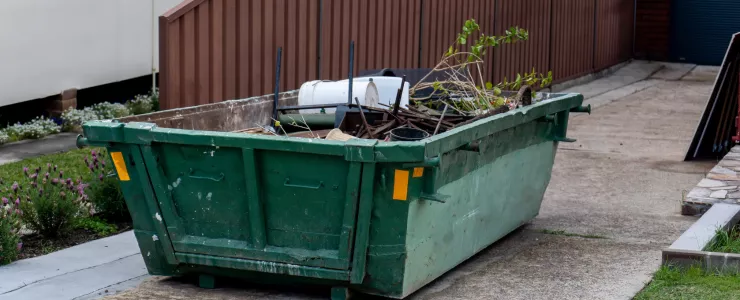
Skips are incredibly versatile and can handle most household, garden, and renovation waste. However, there are important restrictions in place to ensure safety, compliance with environmental laws, and the protection of workers and the environment. When hiring a skip, it’s essential to know what you cannot dispose of in the skip to avoid fines, complications, and potential safety hazards.
Here’s a quick guide to the items that are strictly prohibited from being placed in a skip:
Items that cant be put in a skip
1. Fridges/Freezers
Fridges and freezers cannot be disposed of in skips due to the harmful chemicals they contain, such as CFCs and HCFCs, which can damage the ozone layer. These appliances require special treatment to safely remove hazardous materials. Many skip hire companies will arrange for the proper disposal of fridges and freezers, but this is typically done separately.
2. Upholstered Items
Items such as sofas, armchairs, and mattresses with upholstered fabric are prohibited in skips due to fire safety concerns. Upholstered furniture is often treated with chemicals that need to be disposed of in a controlled manner. If you need to dispose of these items, check with your local council or charity shops for disposal or donation options.
3. Paint Tins
Old paint tins are also a no-go for skips. Paint contains toxic chemicals and solvents that can be harmful to the environment if disposed of improperly. If you have leftover paint, try to use it up or donate it. Otherwise, check for designated recycling centres or special waste collection services that handle hazardous waste like paint.
4. Mattresses
Mattresses are another common item that should never go into a skip. They often contain a mix of materials that can be difficult to recycle, and in some cases, may be treated with chemicals that require safe disposal. Many councils or specialist recycling services will accept old mattresses for recycling.
5. Electrical Items (e.g., TVs, DVD Players)
Electrical items, including televisions, DVD players, fridges, and other electronics, are considered e-waste and cannot be disposed of in a skip. These items often contain hazardous substances like lead, mercury, and cadmium, which need to be safely removed and recycled at specialised facilities. Many councils offer e-waste collection services, or you can take your old electronics to designated recycling centres.
6. Fluorescent Tubes
Fluorescent tubes contain small amounts of mercury, which is highly toxic. As a result, they cannot go into a skip. They must be disposed of in a special way to ensure the mercury does not leak into the environment. Many DIY stores and recycling centres accept fluorescent tubes for proper disposal.
7. Solvents
Solvents, including those used for cleaning or painting, contain chemicals that are hazardous to both people and the environment. These should never be placed in a skip. Many councils or specialist waste disposal services offer collection for solvents or direct you to recycling centres that can handle hazardous chemicals.
8. Liquids
Liquids such as cleaning products, paints, oils, and chemicals should not be put in a skip. These substances can leak, contaminate the waste, and cause environmental harm. If you need to dispose of liquids, check with your local council for the appropriate collection service. Always ensure liquids are stored and disposed of safely according to local regulations.
9. Oils
Used motor oils, cooking oils, and other types of oils are also prohibited from being placed in skips. Oils can cause pollution and pose a fire risk if disposed of improperly. There are specific disposal facilities that handle oils in an environmentally safe way. You can often find collection points at auto repair shops or waste management centres.
10. Batteries
Batteries, including car batteries and household batteries, cannot be disposed of in a skip because they contain hazardous chemicals like lead, lithium, and cadmium. Improper disposal of batteries can cause fires or toxic leaks. Many supermarkets and shops now have battery recycling bins, and there are dedicated recycling points for battery disposal.
11. Carpet
Carpet cannot be placed in a skip as it is difficult to recycle. Carpets are often made from mixed materials, including synthetic fibres, which do not break down easily. If you are replacing carpet, check with your local council or skip hire provider for guidance on responsible carpet disposal, or contact a specialist company that handles carpet recycling.
12. Plasterboard
Plasterboard (drywall) is another common skip exclusion. It’s classified as hazardous waste due to the gypsum it contains, which can release toxic gases if not disposed of correctly. There are special facilities designed to handle plasterboard waste where it can be recycled. Many skip hire companies will ask you to segregate plasterboard from general waste.
13. Hazardous/Toxic Materials
Any material that is classified as hazardous or toxic must not be placed in a skip. This includes asbestos, pesticides, certain chemicals, and contaminated soil. These materials require specialized disposal methods to ensure they are handled and treated properly. Always consult your local authority for the correct procedures for hazardous waste disposal.
14. Gas Cylinders
Gas cylinders, whether they are for camping, industrial use, or gas bottles for home heating, cannot be placed in skips. Gas cylinders can explode if not disposed of correctly, posing serious safety risks. Most councils and skip hire companies offer advice on how to safely dispose of or return gas cylinders to the supplier.
While skips are incredibly convenient for disposing of household, garden, and renovation waste, it’s important to be aware of the restrictions. Certain items, such as fridges, electrical equipment, and hazardous materials, must be disposed of through specialised recycling or waste management services.
By following these guidelines, you can ensure that your waste disposal is safe, legal, and environmentally responsible. Always check with your skip hire company to make sure you're compliant with local regulations, and remember that responsible waste disposal helps protect the environment for future generations.